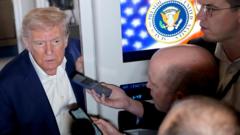The Trump administration has decided to exempt a range of electronic devices, including smartphones and computers, from newly imposed tariffs, a move that brings temporary relief to the technology sector. U.S. Customs and Border Patrol confirmed the exclusion from Trump's global 10% tariff, which also includes larger levies on Chinese imports that reach up to 125%. This is seen as a pivotal moment in Trump's ongoing trade strategy, with analysts calling it a "game-changer."
While traveling to Miami, Trump revealed that more detailed information regarding these exemptions would be shared in the upcoming week, asserting the U.S. is experiencing significant gains from tariff revenues. He emphasized that these measures were essential to facilitate smoother transitions for companies aiming to relocate their manufacturing operations back to the United States.
The exemptions, which date back to April 5, additionally cover essential components such as semiconductors, memory cards, and solar cells. Tech industry leaders, including major firms like Apple and Nvidia, expressed relief over these developments, which are projected to stabilize gadget prices that could have soared if the tariffs had been fully enforced. According to industry expert Dan Ives, the exclusion of electronics from tariffs represents a remarkable win for tech investors.
Moreover, the White House clarified that this decision aims to accelerate domestic production of key technologies, highlighting the increased urgency for companies to diminish reliance on Chinese manufacturing. White House Press Secretary Karoline Leavitt articulated that the strategy resonated with Trump’s broader vision to reclaim manufacturing jobs and bolster U.S. economic independence.
However, the exemptions do not apply to certain tariffs, particularly a 20% tax related to Chinese fentanyl imports, indicating that some overall pressures remain. As iPhone prices could escalate under the previous tariff regime, Apple is already pivoting production to alternative sites like India and Vietnam to mitigate risks tied to its Chinese manufacturing base.
Despite the broader push for reduced tariffs on global trade partners, Trump's administration has maintained elevated tariffs on China. Recent comments from Trump reflect a firm stance against unfair trade practices and underline his commitment to a tough negotiation approach with China that has included targeted tariff increases. The evolving tariff landscape continues to raise questions not only about tech prices but also about the future of international trade relations under current policies.






















